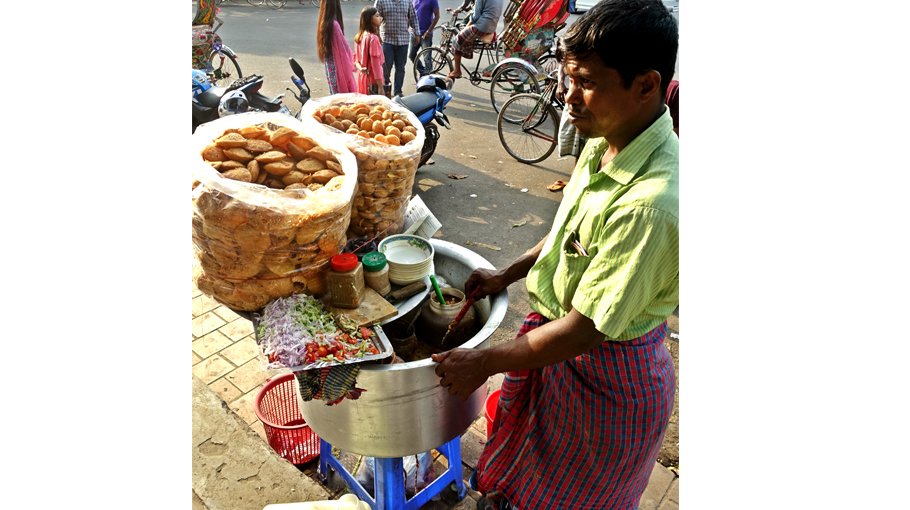Move to regulate street food vendors

Thousands of street food vendors sell ready-made food items, including snacks, fruits, cake, shingara, halim, fuchka and jhalmuri, throughout Dhaka and other cities as well as towns in the country.
Street food vending is the main income source of many poor people in the country. However, most of the street food vendors run their business illegally and unhygienically. Even they don’t maintain the standard of food. They also occupy footpaths and parts of streets and roads in cities and towns, causing immense sufferings to the pedestrians and disrupting vehicular movement.
Against this backdrop, street food vendors are evicted by the law enforcers and other authorities concerned of the government periodically.
Rights activists, experts on public health and people from other authorities concerned said that evicting the street food vendors is not a solution in the Bangladesh perspective. “The process did not resolve the problem as the vendors return as soon as the law enforcers leave the area,” said Syed Mahbubul Alam Tahin, secretary at the Center for Law and Policy Affairs (CLPA).
The public health and environment policy expert, however, said that street food vendors play a vital role in meeting the food demand of urban people. They provide a variety of food for the low-income and middle-income people at a relatively cheap price. Training should be provided for the street food vendors. A policy on the street food vending is needed to ensure safe and healthy food for the people in cities and towns, said Syed Mahbubul Alam Tahin.
He also said that the street food vendors should come under monitoring and licensing system under city corporations as soon as possible.
The Dhaka North City Corporation (DNCC) is planning to bring the street food vendors under the monitoring and licensing system.
Brig Gen Md Zobaidur Rahman, chief health officer of DNCC, said that they are now discussing the matter how to bring the street food vendors in the areas of DNCC under the licensing system and proper management. “It is important to increase awareness to maintain cleanliness and hygiene regarding street food vending. We need to build a social movement for safe street food vending,” he added.
The DNCC has already undertaken a pilot project in a bid to regulate the street food vendors and free walking space on the footpaths in Dhaka city.
According to sources in the DNCC, the pilot project allows street food vendors on the footpaths to operate their business only from 4:00 pm to 10:00 pm in the designated places. They can run makeshift shops five days a week.
BRAC is also working with the DNCC to implement the project. The pilot project began on September 19 this year.
The project has already brought most of the street food vendors in Mirpur-10 area under the system instead of evicting them. Under the project, street food vendors will not be allowed to construct permanent infrastructure. No vehicle will be allowed to stop in the designated places for vendors. Besides, no fees will be collected from them.
A street vendor management committee was formed to verify and prepare the list and database of the street food vendors in Mirpur-10 area. A monitoring team will also be formed at the regional level to ensure normal movement of people and cleanliness on the footpaths, said Maqsud Hashem, chief town planner of the DNCC.
He also said that a policy would be framed regarding the street food vendors.
Md Washim Akhter, programme coordinator of BRAC Urban Development Programme, said that it has been decided that the street food vendors would be brought under a system without evicting anyone and causing any problem to pedestrians. The pilot project is being implemented as per the decision taken by the DNCC.
According to the DNCC’s decision, public representatives will assist in managing the street food vendors. Besides, cleaning staff will also be employed to remove waste.
The DNCC is planning to bring all the street food vendors under its management based on the observations it makes during the pilot project.
Md Humayoun Rashid Jhony, counsellor of Ward No. 14 of the DNCC, said that they have plans to bring the street food vendors in Mirpur-10 area under complete management by this month. “We are now collecting information on vendors through an app. We will completely implement the management programme after collecting everyone’s information,” he added.
Rights activists and experts on public health welcomed the DNCC’s initiative, while the street food vendors of the area are also happy as they are not now in fear of eviction.
Welcoming the initiative to regulate the street vendors, Gaous Pearee, director of the WBB Trust, said that the number of street food vendors is increasing in cities and towns of Bangladesh. A vendor management policy is needed to bring the street food vendors under training and monitoring, she added.
She also emphasised the importance of food safety in street food vending. A large number of the urban population is dependent on street food. It will be possible to provide licence to street food vendors, create a database, monitor the responsibilities and duties of the street food vendors if a policy is formulated, she said.
Almost all countries across the world have street food vendors. They are doing business in neighboring countries as per rules. In Thailand, hawkers are allowed to sit on a part of the sidewalk at certain times. Malaysia has designated areas for street vendors. Several countries, including India, have holiday markets. Kolkata has designated areas for hawkers.
Street food vendor is a very familiar scenario in Dhaka city. The vendors sit in various public places in the city with their products.
According to the Consumers Association of Bangladesh, 97,000 to 200,000 street food vendors sell a variety of prepared foods, including vegetables and fruits. But among all these vendors, there is weakness in compliance with hygiene and cleanliness. They receive no training in this regard and there are shortcomings in supervision.



